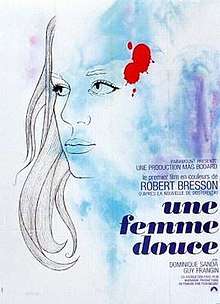A Gentle Woman
A Gentle Woman (French: Une femme douce) is a 1969 French tragedy film[1][2][3][4] directed by Robert Bresson. It is Bresson's first film in color, and adapted from Fyodor Dostoevsky's 1876 short story "A Gentle Creature" (Russian: Кроткая, romanized: Krotkaya). The film is set in contemporary Paris.
| A Gentle Woman | |
|---|---|
 French Poster | |
| Une femme douce | |
| Directed by | Robert Bresson |
| Produced by | Mag Bodard |
| Written by | Robert Bresson |
| Based on | "A Gentle Creature" 1876 short story by Fyodor Dostoyevsky |
| Starring | Dominique Sanda Guy Frangin Jeanne Lobre |
| Music by | Jean Wiener |
| Cinematography | Ghislain Cloquet |
| Edited by | Raymond Lamy |
Release date |
|
Running time | 88 minutes |
| Country | France |
| Language | French |
The tragedy is characterised by Bresson's well known ascetic style, without any dynamic sequences or professional actors' experienced and excessive expressions. Dominique Sanda, who plays the titular "gentle woman", made her debut in the film, starting her career as an actress. Bresson chose her just as a result of her first voice call.[5]
Although the film applies a background of 1960s Paris, such as Muséum national d'histoire naturelle and Musée National d'Art Moderne, its theme adheres closely to the novella.
Bresson subsequently made another adaptation of Dostoevsky, his next film Quatre nuits d'un rêveur (Four Nights of a Dreamer) (1971) based on White Nights.
Plot
The film opens with a falling scarf, leading us to a young woman's dead body on the street. From the later scenes, we understand that the young woman was Elle (Dominique Sanda), who steps off the balcony of her Parisian apartment, plunging to her death. Why has she done it? As her distraught husband, Luc (Guy Frangin), looks over her dead body, and explores what led her to kill herself in a talk to the maid, the picture traces their lives together in flashbacks. Elle is A Gentle Creature—meek, dreamy and thoughtful. She entrances Luc, who pursues her passionately. They marry, but the match never seems right. The story reveals their desperate, despairing miscommunication. Though they try many diversions (theater, television, films) these are momentary respites for the two of them (for Elle more-so, as we see with her interest in Hamlet, which plays out in an extended scene). Their dialogue only deepens her isolation and sadness.
Cast
- Dominique Sanda as Elle
- Guy Frangin as Luc, Elle's husband
- Jeanne Lobre as Anna, the maid
References
- Ginestet, Gaëlle. "Une femme douce by Robert Bresson: Hamlet or Anti-Cinematography" (PDF). shakscreen.org. Retrieved 6 April 2019.
- Swanky, Shawn (17 March 2015). How to Improve Your Movie Literacy With Robert Bresson. Dragon Heart. Retrieved 6 April 2019 – via Google Books.
- Cunneen, Joseph (2003). Robert Bresson: A Spiritual Style in Film. Continuum. Retrieved 6 April 2019 – via Google Books.
- Kehr, Dave. "FILM; A Legend of French Film Whose Legacy Is Clarity". www.nytimes.com. Retrieved 6 April 2019.
Yet the deaths in these films are as much ceremony as tragedy. The heroine of Une Femme Douce (A Gentle Woman, 1969) considers killing her husband but kills herself instead; the protagonist of L'Argent (1983) murders an old woman and walks off impassively to his execution. In both cases, Mr. Bresson withholds the psychological factors that may have motivated the actions; their gestures are accomplished with a blank automatism that suggests an ancient sacrifice, a yielding to the gods.
- Samuels, Charles Thomas. "Encountering Directors: Robert Bresson". Masters of Cinema. Archived from the original on 18 August 2010.